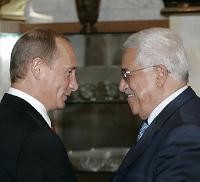This post by James Lamond at Democracy Arsenal breaks the mold of EU criticism by foregoing the derision and simply . . . presenting a useful analysis of some of the obstacles the EU faces with regards to formulating a coherent and effective foreign policy. That said, I think Lamond — and EU critics in general — places a bit too much emphasis on the “speaking with two voices” and “divergent interests” problems, and fails to give the “ability to deliver” problem its due. The fifty states, after all, have divergent interests, which explains the wide range of American opinion […]
Middle East & North Africa Archive
Free Newsletter
I’m not sure how much weight I give the Larijani and Hamas comments on the UN resolution, and to a lesser extent the ceasefire proposal, that Petra referenced earlier. It’s been pointed out elsewhere that the Damascus-based, Meshaal-led wing of Hamas is more militant than the Haniyeh-led wing on the ground (read: in harm’s way) in Gaza, and the latter has signalled more of a willingness to reach a tacit modus vivendi with Israel. Plus, at this point, what matters is what’s being said at the negotiating table in Cairo, and if the proposal was really a non-starter, the Hamas […]
Even before the U.N. Security Council adopted resolution 1860 Thursday that “stresses the urgency of and calls for an immediate, durable and fully respected ceasefire leading to the withdrawal of Israeli forces from Gaza,” it was clear that one of the parties calling the shots (literally) was firmly opposed to the proposals that had been put forward to end the fighting in Gaza: Ali Larijani, the influential speaker of the Iranian parliament, described the proposals on Thursday as “honey injected with poison.” The night before, Larijani had met with Hamas leader Khaled Meshaal and several high-level officials from Hamas at […]
A rule of thumb in Chinese medicine is that it takes a month of healing for every year of illness. The implications for the Israeli-Palestinian conflict should be obvious, but if they aren’t, this Economist piece titled “The Hundred Years’ War” ought to make things clear. There are examples from recent history of reconciliation between warring nations and peoples. I’m thinking of the rehabilitation of Germany in Europe, and more recently still, the still-astonishing, post-apartheid transition in South Africa. But it takes time, and that’s something the Israeli-Palestinian conflict rarely seems to offer peace efforts. That said, and keeping in […]
The Washington Times, citing the Nelson Report, reports that Barack Obama has selected Dennis Ross to coordinate the administration’s policy toward Iran. The Ross pick is not surprising given that Ross was one of Obama’s top foreign policy advisers during the campaign, and often spoke about Iran policy. So what does the pick say about the administration’s likely approach to Iran? Ross laid out his approach to Iran at a June panel at the Center for a New American Security in Washington. I live-blogged the event, and you can read my post here. In a nutshell, Ross said he favored […]
Once you get past the obligatory extra heapings of ridicule, criticism of the EU usually falls into one of two categories. The first is hostile to idea of an institutionally strong, global actor; the second is skeptical that one can emerge. Judy Dempsey’s IHT column on the efforts to broker a Gaza ceasefire doesn’t disappoint, beginning with a caricatural description of the “competing” European diplomatic missions to the Middle East, before breaking towards the latter category. Dempsey presents some compelling shortcomings of the EU’s Middle East policy, as well as some convincing internal obstacles to resolving them. But what’s interesting […]
For obvious reasons, this lede from Keith Bradsher’s IHT piece describing how the Chinese are cooling to U.S. government debt got me clicking through to the Merriam-Webster definition of the word, “crisis”: China has bought more than $1 trillion in American debt, but as theglobal downturn has intensified, Beijing is starting to keep more ofits money at home — a shift that could pose some challenges to the U.S.government in the near future but eventually may even produce salutaryeffects on the worldeconomy. Theword has its roots in medical usage, and me being the optimist that Iam, I’d identified it with […]

Since the moment Israel decided to launch a major military campaign against Hamas to stop rocket attacks from Gaza, the experience of the 2006 war against Hezbollah has served as a template of all that could go wrong. Like this conflict, the 2006 war came after a serious provocation by a radical Islamic group whose stated aim is the destruction of Israel. As in this war, the 2006 war presented Israel with the moral and tactical challenge of fighting a force that targets Israeli civilians, yet hides among its own population and cries foul when non-combatants are killed. The war […]
Shadi Hamid pursues the debate about democracies and foreign policy, pointing out, among other things, that he didn’t describe the foreign policy of democracies as “more stable” (my description) than that of dictatorships, but rather as “stronger, more effective and more predictable.”While he concedes that there’s an implication of stability, he’s also right to point out the distinction. But keeping that distinction in mind, who fits Hamid’s description better over the past eight years, the U.S. or China? Reaching backwards historically, the Soviet Union, too, had a strong, effective and utterly predictable foreign policy. Among Middle Eastern countries, I’d propose […]
I’m not really sure what motivates the derision in David Kenner’s FP Passport write-up of French President Nicolas Sarkozy’s diplomatic activism, currently on display in the Israel-Hamas conflict: The French president has tasked himself with the modest goal ofnegotiating an immediate ceasefire to the carnage in Gaza. Even if hefails to score a diplomatic victory, his whirlwind tour will no doubtrepresent a triumph of travel booking. . . . The French taxpayers are getting precious few diplomatic victories fortheir money, but many headlines. And that seems to suit them just fine.Sarkozy’s trips have raised France’s international profile, much to thepleasure […]

In her WPR column analyzing potential brokers of a ceasefire in the Gaza Strip, Frida Ghitis did not consider a possible role for Russia — and with good reason. While Moscow has sought to position itself as a Middle East kingmaker for decades, its diplomatic initiatives have been noteworthy as much for their minimal results as for their persistence. At present, there is no reason to believe that Russia will have anything more than a negligible influence on the current Gaza crisis. In some respects, this is unfortunate, since it would be extremely helpful if Moscow were able to compel […]
Without getting too blogged down in Gaza, I’d like to respond to some criticisms that have been raised to a recent post, both here on the WPR blog, and in comments at Friday Lunch Club. I’ll start with Petra’s welcome feedback, which adds needed perspective in a pitch-perfect tone, something rare for this isssue. Indeed, one of the reasons I usually try to avoid writing too much about it isbecause it requires a long list of caveats, which I might one day takethe time to compose and link to each time I get the urge to weigh in,but which essentially […]
In a recent postaptly entitled “Bringing the Negotiating Table to Hamas,” Judahtempered his critical view of Israeli policies with the acknowledgementthat he was writing “from the comfort of a Paris apartment, beyondmissile range from Gaza.” Indeed, things look quite different fromwhere I live, which is just on the outskirts of Tel Aviv-Yaffo — andjust on the edge of the area threatened by missiles from Gaza. When Ilook south from my balcony, I can see Ashdod, which has already been struck by missiles with deadly consequences. This goes to illustrate that Israel is simply too small a countryto leave its southern […]
TEL AVIV, Israel — In a recent post aptly entitled “Bringing the Negotiating Table to Hamas,” Judah tempered his critical view of Israeli policies with the acknowledgement that he was writing “from the comfort of a Paris apartment, beyond missile range from Gaza.” Indeed, things look quite different from where I live, which is just on the outskirts of Tel Aviv-Yaffo — and just on the edge of the area threatened by missiles from Gaza. When I look south from my balcony, I can see Ashdod, which has already been struck by missiles with deadly consequences. This goes to illustrate […]
